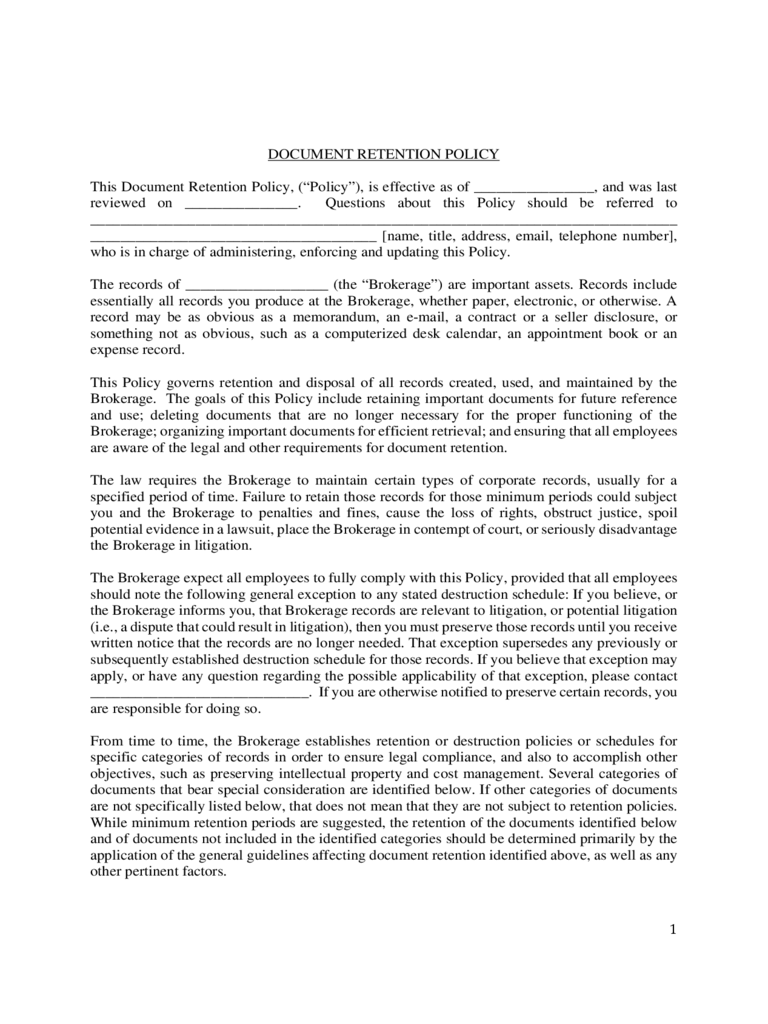Fillable Printable Document Retention Policy Template Sample
Fillable Printable Document Retention Policy Template Sample

Document Retention Policy Template Sample

1
DOCUMENT RETENTION POLICY
This Document Retention Policy, (“Policy”), is effective as of ________________, and was last
reviewed on _______________. Questions about this Policy should be referred to
______________________________________________________________________________
______________________________________ [name, title, address, email, telephone number],
who is in charge of administering, enforcing and updating this Policy.
The records of ___________________ (the “Brokerage”) are important assets. Records include
essentially all records you produce at the Brokerage, whether paper, electronic, or otherwise. A
record may be as obvious as a memorandum, an e-mail, a contract or a seller disclosure, or
something not as obvious, such as a computerized desk calendar, an appointment book or an
expense record.
This Policy governs retention and disposal of all records created, used, and maintained by the
Brokerage. The goals of this Policy include retaining important documents for future reference
and use; deleting documents that are no longer necessary for the proper functioning of the
Brokerage; organizing important documents for efficient retrieval; and ensuring that all employees
are aware of the legal and other requirements for document retention.
The law requires the Brokerage to maintain certain types of corporate records, usually for a
specified period of time. Failure to retain those records for those minimum periods could subject
you and the Brokerage to penalties and fines, cause the loss of rights, obstruct justice, spoil
potential evidence in a lawsuit, place the Brokerage in contempt of court, or seriously disadvantage
the Brokerage in litigation.
The Brokerage expect all employees to fully com ply with this Policy, provided tha t all employees
should note the following general exception to any stated destruction schedule: If you believe, or
the Brokerage informs you, that Brokerage records ar e relevant to litigation, or potential litigation
(i.e., a dispute that could result in litigation), then you must preserve those records until you receive
written notice that the records are no longer needed. That exception supersedes any previously or
subsequently established destruction schedule for those records. If you believe that exception may
apply, or have any question regarding the possible applicability of that exception, please contact
_____________________________. If you are otherwise notified to preserve certain records, you
are responsible for doing so.
From time to time, the Brokerage establishes retention or destruction policies or schedules for
specific categories of records in order to ensure legal compliance, and also to accomplish other
objectives, such as preserving intellectual property and cost management. Several categories of
documents that bear special consideration are identified below. If other categories of documents
are not specifically listed below, that does not mean that they are not subject to retention policies.
While minimum retention periods are suggested, the retention of the documents identified below
and of documents not included in the identified categories should be determined primarily by the
application of the general guidelines affecting document retention identified above, as well as any
other pertinent factors.

2
(a) Brokerage Records. The following records in any one file relating to any real estate
transaction shall be retained for at least five (5) years following its consummation:
(i) Any written offers to lease or purchase the real estate;
(ii) The acquisition of and disbursement of any monies;
(iii) Listing and sales contracts;
(iv) Closing sheets;
(v) Property disclosure forms; and
(vi) Agency disclosure forms.
(b) Accounting Records
(i) Accounts payable and receivable (seven years)
(ii) Annual financial statements (permanently)
(iii) Bank statements (seven years)
(iv) Accounting correspondence: routine (four years)
(v) Deeds and closing papers (permanently)
(vi) Deposit slips (four years)
(vii) Employee expense reports (seven years)
(viii) Income tax returns (permanent)
(ix) Inventory count & costing sheets (seven years)
(x) Insurance policies (four years after expiration)
(xi) Investments (seven years after disposal)
(xii) Payroll journals & ledgers (permanently)
(xiii) Purchase orders (except accounts payable copy) (one year)
(xiv) Purchase invoices & orders (seven years)
(xv) Receiving sheets (two years)
(c) Brokerage Corporate Records
(i) Articles of incorporation and amendments (permanently)
(ii) Bylaws and amendments (permanently)
(iii) Corporate filings (permanently)
(iv) Corporate minute book (perm anently)
(v) IRS exemption letter (permanently)
(d) Employment Records
(i) Documents relating to job recruitment: advertising, job orders submitted to
employment agencies, interviewing, testing, hiring, training, demotions,
promotions, layoffs, discharges, and other personnel decisions (one year)
(ii) Employee benefit plan documents (duration of plan)
(iii) Garnishments/wage assignments (three years)
(iv) Immigration I-9 forms (duration of employment plus one year, m inimum of
three years)
(v) Payroll records showing name, address, date of birth, occupation, rate of
pay, and weekly compensation (three years)
(vi) Personnel records (ten years after employment ends)

3
(e) Legal Documents
(i) Other Contracts (ten years after expiration)
(ii) License applications (one year after expiration)
(iii) Licenses (one year after expiration)
(iv) Trademarks, patents & copyrights (permanently)
(v) Warranties & guarantees (two years beyond terms of the warranty)
(vi) Legal correspondence: (permanently)
(f) MLS Documents
(i) Rules and regulations (permanently)
(ii) MLS policies (permanently)
(iii) Sold property information (permanently)
(iv) Lockbox key agreements (one year after agreement terminates)
(v) MLS service mark license agreements (permanently)
(vi) Subscription agreements (ten years after expiration)
(vii) Participation agreements (ten years after expiration)
(viii) Web site click-through confirmations (ten years)
(f) Property Records
(i) Deeds of title (permanently)
(ii) Depreciation schedules (permanently)
(iii) Property damage (ten years)
(iv) Property tax (permanently)
(v) Appraisals (permanently)
(vi) Blueprints/plans (permanently)
If you have any questions regarding whether to retain a certain document, contact the above-named
person for guidance. Failure to comply with this Document Retention Policy may result in punitive
action against the employee, including suspension or termination.
READ, UNDERSTOOD, AND AGREED:
____________________________________
By: _________________________________
Date: _______________________________



